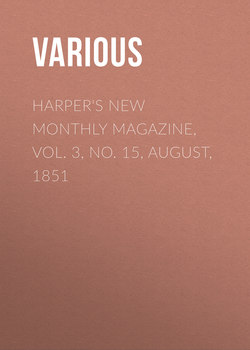Читать книгу Harper's New Monthly Magazine, Vol. 3, No. 15, August, 1851 - Various - Страница 5
VILLAGE LIFE IN GERMANY
THE CLUB
ОглавлениеLesmona possesses a club. Its meetings are suspended during summer, but are resumed as autumn wanes. Professedly, it is a whist club; but card-playing is in reality the least of its objects, its chief intention being to cultivate a kindly feeling among the inhabitants of the village and the neighborhood, by bringing them periodically together. I was duly balloted for and admitted. On the Friday evening after this honor was conferred on me, I was introduced. The meetings were held in Meyerholz's inn, and in the same apartment which had served as a ball-room. Here I found a dozen or fifteen of the notabilities of the place assembled. In a short time they assorted themselves, and sat down, some to whist, some to chess, while others contented themselves with looking on. The points at whist were fixed at a grote, about equivalent to a halfpenny – any higher play would have been considered gambling, and would have been regarded with extreme disfavor. Doctor W – 's phrase, "To be, or not to be," was, I now found, the usual signal for the end as well as the beginning of the game. Wine, and still more commonly beer, were imbibed during the course of it. The wine usually drank in that part of the world is French wine – St. Julian or some other Bordeaux wine is the commonest. Rhenish wine is very rare. Some indulged in what they called "grogs" – a "grog" is a small tumbler of brandy-punch. Almost all smoked; indeed the pastor of the village was the only person in it who never did. The pipe was much preferred to the cigar, the smoke from the latter being apt to be troublesome when the hands are engaged. Of course the pipe was the long German one, consisting of mouth-piece, flexible tube, polished or cherry-tree stem, schwammdose or receiver, and the more or less ornamented head or bowl. Since I am speaking of pipes, I may mention that in Germany every smoker possesses several – and these, of course, vary much in length, calibre, and value. There is abundant opportunity of displaying the owner's taste. Some have their armorial bearings painted on the bowl. Among students, again, it is common to present a friend with a bowl bearing one's likeness, the said likeness being a silhouette or shade in profile. There are, of course, all the other varieties of bowl; some have female figures, others landscapes or public buildings, others the likenesses of well-known characters – John Ronge was rather a favorite at the time I speak of. As to the stem, the most esteemed are those of the cherry-tree, brought from the Vistula. These stems disengage a pleasant odor.
But to return. "To be, or not to be," says Dr. W – as he rises. The rest of the party finish their games, and think of supper. It is a slight repast; each orders what he chooses, and there is no set table. A beefsteak or a sandwich are the most common viands. The German expression for sandwich, by the way, is rather circumlocutory – the literal translation of it is, "a butter-bread-with-meat;" it is like some of the other composite terms in that language which strike a beginner as being so odd —hand-shoes, for instance, or finger-hat, for gloves and a thimble.
The club used to meet every Friday. Each alternate week, however, we had what was called a ladies' club. On these occasions, the female portions of the families of members were entitled to be present. The only other difference was, that, when ladies came, the gentlemen abstained from smoking pipes, and confined themselves to cigars.
But it is time to break up. Cloaks and great-coats are donned. There is a lighting of lanterns, for the roads are dark, and some of us have a considerable way to go. We separate with a simultaneous "Good-night – may you sleep well."
